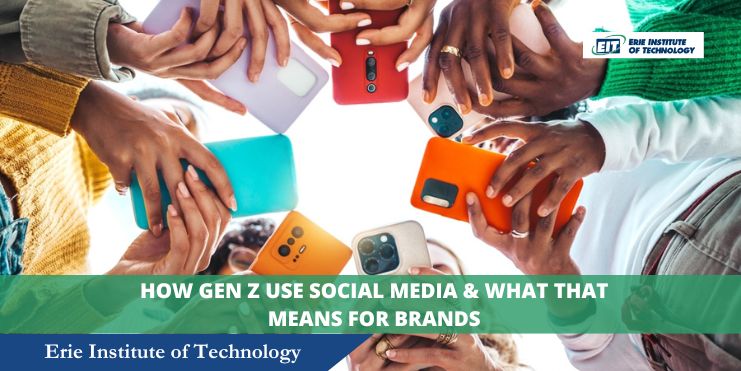
Every day, more and more users join social media to stay connected, informed, and entertained. For advertisers, this presents unique opportunities to shape brands and get in front of diverse demographics. Digital audiences across multiple generations are interacting with social media at exponential rates. With one exception: Gen Z.
Gen Z refers to those born between 1997 and 2012, a generation of people who will never experience life without the Internet and social media. Their unique disposition makes Gen Z a highly desirable (and illuminating) demographic for digital marketers. Yet ironically, in a world of increasing social media interactions, Gen Z’s usage is declining.
For Gen Z, social media was never a novel concept. More than an amenity, it’s always been an essential thread in the fabric of their reality. So, how does Gen Z use social media and what can brands do to appeal to their habits and ethics?
Let’s “zoom” in for a closer look…
Why Social Media Is Integral to Gen Z’s Life
As the first true digital natives, Gen Z grew up in a world where smartphones and internet connectivity are as fundamental as electricity. The unprecedented integration of social media into daily life transformed how they consume information, interact with brands, and navigate routines.
Unlike previous generations who adapted to social media, Gen Z uses these platforms as a natural space for information gathering. Data from a 2024 survey reveals that Gen Z leads all generations in using social media for product discovery, news consumption, and customer service interactions. These statistics represent more than just a preference—it’s a fundamental shift in how an entire generation interfaces with the world.
The encompassing role of social media in Gen Z’s life extends far beyond casual entertainment. From researching products to seeking customer support, Gen Z uses social platforms like Boomers used the library, the Yellow Pages, or good old-fashioned face-to-face communication.
This behavior should signal a crucial shift for brands attempting to reach Gen Z. Marketing to them on social media isn’t just another experimental digital strategy—it’s the primary approach to building relationships with an influential demographic that makes up ~20% of the US population.
Popular Social Media Platforms Among Gen Z
Recent data reports reveal a clear hierarchy in Gen Z’s social media preferences, each platform serving distinct purposes in their digital lives:
YouTube
YouTube dominates the landscape, capturing 80% of Gen Z’s attention and ranking as the top platform among more than half of the demographic. The platform’s popularity stems from its versatility in offering both long-form educational content and entertainment.
Instagram follows closely, engaging 75% of Gen Z users. The platform has evolved from a simple photo-sharing app to a comprehensive hub for product discovery and brand interaction. Its visual-first approach aligns perfectly with Gen Z’s preference for immersive, image-driven content.
TikTok
TikTok has rapidly ascended to capture 69% of Gen Z users, establishing itself as the go-to destination for short-form video content. The platform’s algorithm-driven content discovery has revolutionized how Gen Z consumes entertainment and discovers new trends.
Snapchat
Snapchat maintains a vital presence among 63% of Gen Z users. It primarily serves as a platform for authentic, direct communication with peers and appeals to Gen Z’s desire for more genuine, less curated social interactions.
The influence of these platforms on purchasing decisions cannot be understated. Two-thirds of Gen Z report making purchases based on social media advertisements, highlighting the crucial role these platforms play in their consumer journey.
Gen Z’s Preferred Content Types and Engagement Patterns
Short-form video has emerged as the dominant content format for Gen Z, with platforms like TikTok, Instagram Reels, and YouTube Shorts leading the charge. This preference reflects Gen Z’s desire for quick, digestible content that delivers maximum impact in minimum time.
User-generated content (UGC) has become a cornerstone of trust-building with this generation. Gen Z values authenticity over polished marketing materials, preferring to see real people using and reviewing products. This shift has fundamentally altered how brands approach content creation, with many now prioritizing authentic, unfiltered content over professionally produced marketing materials.
The viral nature of memes and shared pop culture moments has created a new language of engagement for Gen Z. These cultural touchstones serve as both entertainment and communication tools, allowing brands to participate in trending conversations too.
Gen Z’s Social Media Behavior
Gen Z’s approach to social media is deeply rooted in their core values:
- Authenticity
- Individuality
- Social Consciousness
This generation is skeptical toward traditional marketing approaches, instead gravitating toward brands that align with their values and communicate transparently.
Their mobile-first behavior sets them apart from previous generations. For Gen Z, smartphones are the primary gateway to information and commercial consumption. This constant connectivity shapes their expectations for brand interaction. Gen Z demands an immediate, seamless experience across platforms.
Influencers & Creators in Gen Z Marketing
The influencer landscape has undergone a significant transformation, with Gen Z preferring content creators who maintain authentic connections with their audiences over traditional influencers. This shift is exemplified by creators like Kyle Prue, whose partnership with Fizz demonstrates the power of maintaining authenticity in branded content. With over 1.4 million followers, Prue’s content for Fizz seamlessly integrates with his content, making the brand messaging feel natural and genuine.
TikTok creator Alix Earle represents another successful example of this new influencer blueprint. Despite Earle’s unpolished approach, she’s managed to foster connections with an audience of 5 million followers and growing. Even as her lifestyle becomes more aspirational, her success underscores Gen Z’s preference for authentic, relatable content over perfectly curated feeds.
Successful brand collaborations in this space rely on genuine partnerships that prioritize creator authenticity over traditional marketing messaging. Brands that integrate product messaging naturally without sacrificing creators’ unique voices tend to see the strongest engagement with Gen Z audiences.
Social Media Trends Among Gen Z
While Gen Z remains highly engaged with social media, a notable shift toward offline experiences is emerging. This generation increasingly seeks ways to translate digital connections into real-world interactions, creating opportunities for brands to bridge the virtual and physical worlds.
Ironically, as AI-generated content becomes more prevalent, Gen Z shows growing skepticism toward synthetic media. Their preference for authentic, human-created content reflects a desire for genuine connections in an increasingly automated digital landscape.
Best Practices for Brands to Reach Gen Z on Social Media
Successful Gen Z marketing and brand engagement requires a strategic approach focused on authenticity and meaningful interaction. Brands must develop a distinct, human voice that resonates with Gen Z’s values and communication style. This includes:
- Using conversational language.
- Responding to comments personally.
- Participating in relevant cultural moments.
Other best practices for Gen Z marketing include:
- Create User-Generated Content (UGC)
UGC serves as a powerful tool for building trust. Brands should actively encourage and showcase authentic customer experiences, leveraging this content to create a community around their products or services.
- Foster Niche Partnerships
Partnerships with niche influencers who genuinely align with brand values prove more effective than traditional celebrity endorsements. These collaborations should prioritize authentic storytelling over promotional messaging.
- Create Platform-Specific Content
Incorporating humor and relatable content helps brands connect with Gen Z’s unique online culture. However, this approach requires genuine understanding and participation in platform-specific trends rather than forced attempts at relevance.
Level Up Your Skills with a Social Media Marketing Program at Erie Institute of Technology (EIT)
Understanding Gen Z’s social media behavior has become crucial for modern marketing success. As platforms like TikTok, Instagram, and YouTube continue to evolve, the demand for skilled social media marketers grows proportionally.
Erie Institute of Technology’s Web Design and Social Media Marketing Program prepares professionals to navigate this dynamic landscape. Our curriculum focuses on practical skills in content creation, platform strategy, and audience engagement, with particular emphasis on reaching younger demographics effectively.
By mastering these platforms and understanding Gen Z’s unique preferences, EIT graduates position themselves at the forefront of digital marketing innovation. Request more information about our social media marketing program and get ready to create impactful social media strategies that resonate with today’s most influential consumers and most sought-after employers.

Ross Aresco
CFO
Ross Aresco is the CFO of Erie Institute of Technology. Erie Institute of Technology (EIT) is an Erie Pennsylvania technical/trade school providing training programs for medical, computer, electronics, manufacturing, and technology careers. EIT offers programs in many different areas to suit your interests and talents.
